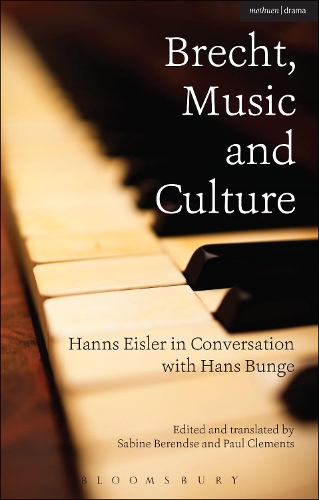
Brecht, Music and Culture: Hanns Eisler in Conversation with Hans Bunge
(Paperback)
Available Formats
Publishing Details
Brecht, Music and Culture: Hanns Eisler in Conversation with Hans Bunge
By (Author) Hans Bunge
Translated by Sabine Berendse
Translated by Paul Clements
Volume editor Sabine Berendse
Volume editor Paul Clements
By (author) Hanns Eisler
Bloomsbury Publishing PLC
Methuen Drama
24th September 2014
United Kingdom
Classifications
Professional and Scholarly
Non Fiction
Literary studies: c 1900 to c 2000
Individual actors and performers
Theatre studies
832.912
Physical Properties
Paperback
312
Width 138mm, Height 216mm
363g
Description
The Austrian composer Hanns Eisler was Bertolt Brecht's closest friend and most politically committed collaborator. In these conversations with Hans Bunge which took place over a period of four years, from 1958 until his death in 1962, Eisler offers a compelling and absorbing account of his and Brecht's period of exile in Europe and the USA between 1933 and 1947, and of the quality of artistic, social and intellectual life in post-war East Germany. Brecht, Music and Culture includes a discussion of a number of Brecht's principal plays, including Life of Galileo and The Caucasian Chalk Circle, considers the place of music in Brecht's work and discusses the time that Brecht was brought before The House of Un-American Activities Committee. It includes lively accounts of Brecht's meetings with key cultural figures, including Arnold Schnberg, Charlie Chaplin and Thomas Mann, and offers throughout a sustained response to the question of the purpose of art in a time of political turmoil. Throughout the conversations, Eisler provides illuminating and original insights into Brecht's work and ideas and gives a highly entertaining first-hand account of his friend's personality and attitudes. First published in Germany in 1975, and now published in English for the first time, the conversations provide a fascinating account of the lives and work of two of the twentieth century's greatest artists.
Reviews
Th[is] edition is a labour of love. ... Together with Paul Clements, [Berendse] has crafted not only a readable but a highly engaging rendition of a series of conversations whose length makes them suitable for a sustained read or a more relaxed series of perusals ... [This] edition offers rich anecdotal accounts of Brecht, the German Democratic Republic, and disquisitions on the relationship between politics and music. * New Theatre Quarterly *
Eislers conversations with Hans Bunge about Brecht focus on their time together in Hollywood as well as on the building of a magnificent new social republic. For Eisler, the be-all and end-all of their work was to educate the teacher! The most fascinating and perplexing aspect of the conversations turns on the effort to study the effect of art on human beings. The lesson of the great modernists was the lesson of socialism. In other words, ending capitalism was the precondition for making and understanding great art. -- Todd Cronan, Emory University, USA * Radical Philosophy 189 *
The important achievement of the translators ... is to have made available to the English-speaking world a landmark volume published almost forty years ago -- Ian Wallace * Eisler-Mitteilungen *
As Brechts essay on gestic music makes clear, the concept of gestic performance emerged from his close collaborations with composers. Bloomsburys companion volume, Brecht, Music and Culture, is thus doubly welcome, first for translating Eislers thoughtful conversations with Hans Bunge, Fragen Sie mehr ber Brecht (1970), and second for explaining rather than mis-translating Verfremdung and so helping to consolidate a Brecht lexicon consistent with the new Brecht on Theatre. This publication also draws attention to the uneven transmission of Brechts musical collaborators critical commentary, as well as musical compositions. * Theatre Journal *
Author Bio
Hanns Eisler was an Austrian composer. A Schoenberg pupil and committed Marxist, he was one of the great distinctive musical personalities of the twentieth century. Hans Bunge was assistant director and dramaturg at the Berliner Ensemble in Germany in the 1950s and later became first director of the Brecht Archive. He published his conversations with Eisler in Germany under the title Gesprche mit Hans Bunge Fragen Sie mehr ber Brecht. Sabine Berendse, the daughter of the late Hans Bunge, is a Librarian and Information Specialist in Berlin, Germany. Paul Clements was Principal of Mountview Academy of Theatre Arts in London, UK, for twelve years until his retirement in July 2008. He has taught, acted and directed in the UK, Canada and Scandinavia.
